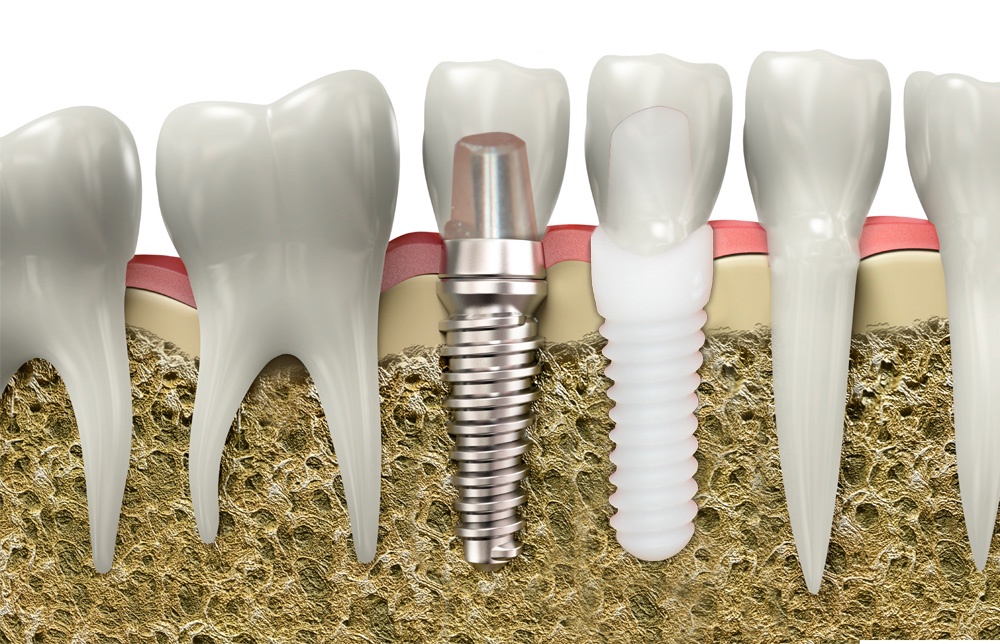When you lose a tooth, you should have it replaced. This prevents other teeth from shifting, which can lead to issues including gaps and misalignment. All of this influences how you chew and grin.
Dental implants are a permanent remedy for lost teeth. They are shaped like small screws and surgically placed into the jawbone to operate as your natural tooth root, allowing a prosthetic tooth to be linked to it.
Dental implants, unlike bridges, do not require neighboring teeth for scaffolding; they are more stable and endure longer than dentures. They also help to strengthen the jawbone.
Dental implants can be constructed from titanium or zirconia, a form of ceramic. So, which is better suited?
Zirconia Implants vs Titanium implants
Titanium Implants
Titanium implants have been used since the 1960s and continue to be the most prevalent form of dental implant, with a success rate of more than 90%. It also provides numerous possibilities based on angulation, size, and purpose. Also, titanium is often used in full arch dental implants.
Because titanium is blackish-grey, the root of the dental implant may be visible above the gum line, particularly if your gums are thin or receding. This can be ugly, obscuring an appealing smile and calling attention to your dental implants. Because of their color, titanium implants might cause your gums to seem grey.
Another item to consider is that titanium implants are not for everyone. Those who are sensitive or allergic to titanium may experience itching and other inflammatory reactions, leading to bone loss and the implant's inability to integrate properly into the jawbone.
Patients with inflammatory diseases such as rheumatoid arthritis, Crohn's disease, and diabetes may develop local inflammation and discomfort caused by titanium implants.
Consumers are increasingly wary of employing metals in dental procedures. Metals used in dental and surgical implants have been found in studies to enter the body in small amounts and accumulate over time, potentially causing organ damage, neurological disorders, or even cancer.
Titanium corrodes in damp settings, such as the mouth, leaving a metallic taste. Some kinds of toothpaste can accelerate titanium leaching.
Titanium implants have also been linked to yellow nail syndrome, a rare illness with symptoms including nail thickness and yellowing, bronchial obstruction, lymphedema, postnasal drip, and cough-associated sinusitis.
Zirconia Implants
Zirconia dental implants, first in 1987, are constructed of a material that combines the strength of metal with the heat-resistant qualities of ceramic.
It is perfect for dental implants because it is bio-inert, which means it does not erode, cause chemical reactions, or transfer to other locations. Itching and inflammation are not a concern because it is hypoallergenic.
While zirconia is not as strong as titanium, it is extremely durable and widely regarded as superior to other ceramics in terms of fracture toughness. Its exceptionally smooth texture ensures there are fewer crevices for germs, plaque, and calculus to grow in. So, when compared to titanium implants, zirconia dental implants promote cleaner, healthier gum tissue and better dental hygiene.
Zirconia dental implants are also more aesthetically pleasing than titanium implants. Zirconia is white, giving it a more natural appearance and feel. Furthermore, it is easily tinted to match the shade of your original teeth, which is very important when replacing a front tooth.
Caveats of zirconia implants
Zirconia implants are very new in the Singapore market, hence fewer dentists provide them. The long-term function and success of zirconia implants have yet to be proved; they may fail more frequently than titanium implants.
Zirconia implants may not survive as long due to their lower strength. As the product matures, it may degrade at low temperatures, resulting in lower material strength, density, and toughness.
Zirconia implants have fewer alternatives for shape, size, and adaptability than titanium implants. They also frequently come as a single piece, as opposed to titanium implants, which are divided into two sections.
As a result, zirconia implants are not appropriate for sophisticated oral rehabilitation or implant-supported dentures. They are not available to patients who are missing all of their teeth or need all of their teeth replaced with implants.
Zeramex Ceramic Implants: Best of Both Worlds
Zeramax ceramic implants, invented in Switzerland, are a groundbreaking two-part, metal-free implant solution. It combines the safety and aesthetic appeal of zirconia implants with the adaptability of titanium implants.
Zeramex ceramic implants are highly biocompatible and corrosion-resistant, consisting of zirconium dioxide ceramic, which stimulates bone resorption, lowers inflammatory reactions, and enhances blood circulation in the gums.
Zeramex ceramic implants have been tested for stability and extended life, and the findings are good. Zeramex ceramic implants have a healing success rate of over 96%, which has been proven in clinical trials.


No comments yet